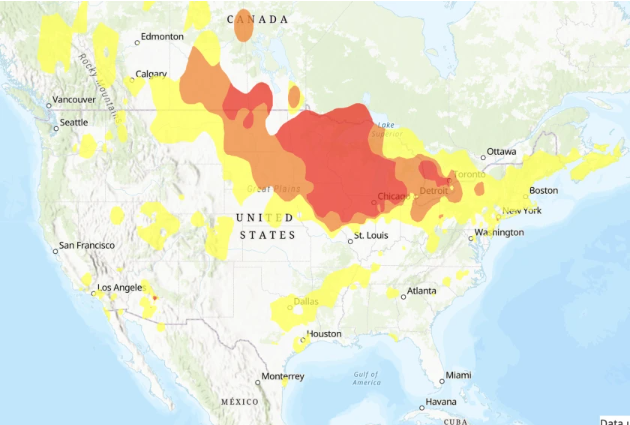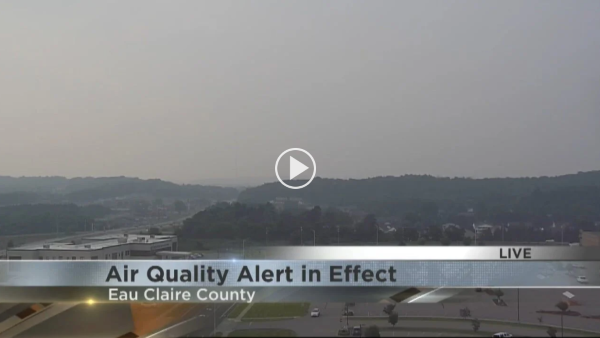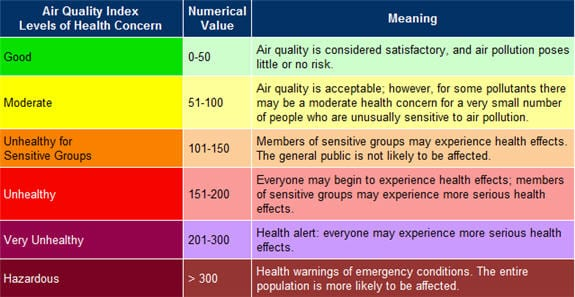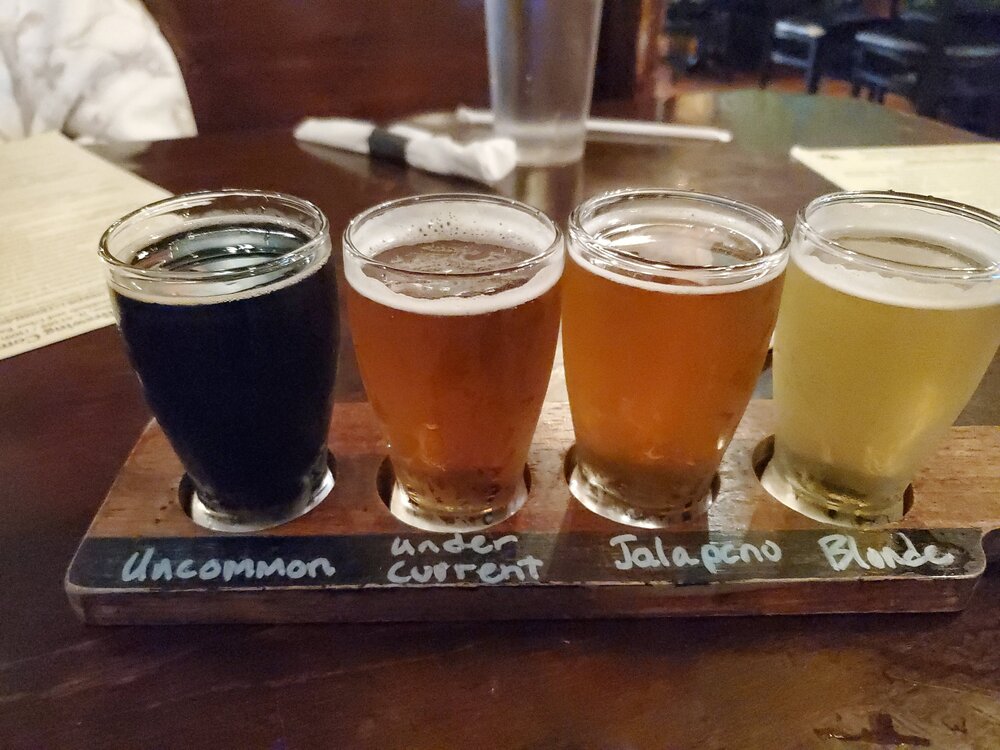-
Posts
470 -
Joined
-
Last visited
Content Type
Profiles
Forums
Store
Downloads
Recruiting - 2020
2019-2020 Football Season
Football
Entertainment
Sports
News and Business
Cloak Room
Transfer Portal
Recruiting
Events
Everything posted by Hayduke
-
Feel for you, @troph. Every parent's story is sorta different, sorta the same. What burns me is my daughter's distance, unwillingness to talk, and a substantial amount of disrespectful expression. Still, she's gone through a breakup that puts everything out of whack. We're trying to get her to move on from that -- a great young man, but from where I sit probably not right for her long-term and the breakup probably came at a fortuitous time (hell, no, haven't said that to her). She needs to think about growing up and finding her own place in the world that's not shaped too much by him. It tell myself that she acts toward me as she does because she's comfortable enough to, so I'll put up with that behavior to a certain extent. At the same time, we need her to focus on opportunities she could let slip away if she doesn't take advantage of them in the next 3-4 crucial months. That's why all these different experiences people share on Surly become so valuable. Lots of good advice worth considering. Even in his book, Seligson briefly touches on admissions officers' dealings with how young adults present their failures and mentions the value of parents giving kids safe places to fail. Sometimes that's all we can do, I think. I think this may be hardest for me to get through. As a professional communicator, I've joked with my daughter about how her test scores hurt me ... lower on writing and reading, high on math and science. She's headstrong, and the one time she asked for help on a school paper, I was absolutely none because I first tried to show that the writing style she used was unnecessarily difficult to understand and not straightforward. She answered, truthfully, that it was what her teacher wanted. Even knowing that, I couldn't get her to consider simple ways to mitigate that and she shut down. In the end it's probably fine -- she did great in the class, and for college apps, her grades/test scores and some possibilities as an athlete will probably be the main drivers. At least I hope. I'm not sure I've got the energy to help with her essays, as the determination she shows as an athlete works just as strongly with avoidance of dad talk.
-
What do you mean by "off the rails," @troph? According to what I'm reading in the Selingo book, the admissions committees want to see an essay that demonstrates traits like passion, compassion, leadership and whatnot. Lots of discussion in the book about applicants who aren't just checking off the extracurricular boxes, but really taking part, demonstrating positive traits and skills, and able to articulate that in an authentic manner -- their own voice. Sounds like he's got a lot of that covered. Hard to tell about the voice, of course, but it sounds like he's on the right track.
-
Usually feels like everything is a shot in the dark, and you know you can't keep spraying those bullets around. Both tough love and sympathy seem like crap shoots, but when your kid knows you care, things are usually registering more than you think at the time. In this case, even if our son doesn't have a lot of luck with his sister, he deserves the money anyway because he has needed very little from us. He's basically paid his own way and has had some really cool experiences. He's smart with his money. Our daughter is very money-driven, and she knows he's probably going to roll over his 529 into an IRA when he's done. When she gets the advance bottom-line figures from us, she'll listen to him very carefully ... And if I don't have to be in charge of a couple of the campus visits, it's the best money I've spent all summer. I've survived one. Good visit, but outsourcing is my new best friend.
-
Both a waste and the best money you can spend, IMO. Had our son not come home this weekend, I wouldn't have thought of hiring him. Wife and I just agreed to pay him $1,000 to be his sister's admission consultant and we're giving him an additional $1,500 to play with as bonus money to get her to visit three schools while he's here for a week or two (and he'll be in charge of taking her). He can use the money to bribe her to go if needed, so we'll see how the capitalistic aspect of that works. (Aside: son just came home a little early from his D.C. internship; will continue doing some agency work remotely while also doing a remote campus job that's pretty high in managerial responsibility, but he said he was going to work at the country club with a buddy as a fry cook to have something else to do while at home. Part of his duties are to read the Selingo book, which will be of help to him in his campus job.) Me: "Do you know if Jane is around this summer?" (not her real name: goes to MIT, is on an intercollegiate team in a common sport with my daughter) Daughter: "No." Dad messages Jane's mom, asks if she's around. Mom says she'll have Jane reach out. Me: "I know you're probably not going to like this, but I contacted Jane's mom to see if she's here this summer ..." Daughter: "WHY WOULD YOU DO THAT!!??!!?!! I see her every day in summer team gatherings!" Yep. I hear variants of your story over and over and over, @troph. We've got a family meeting coming up this week with some laying down of the law. Counting on son to be the moderating influence.
-
Bumping this after perusing various college-related threads and tracking down the book I believe @CooterBrown referred to a couple of pages back, which is Jeffrey Selingo's "Who Gets In and Why." Was only $1.99 on Kindle and that's two bucks very well spent, although his new book is coming out soon and the spreadsheet he puts together on various colleges is free for download on his web site. That spreadsheet is very useful. Couple of questions: anybody hired a coach or other consultant? Would be interested in hearing your experiences, as others on this thread probably would. We decided to hire one on the cheap ... our son, who's graduating in May and who probably has his younger sister's ear a lot better than I do. She listens, but she doesn't talk, and that's what we need right now from her. She'll get into either of the two flagships closest to us, but she has other good options that she simply refuses to talk about right now. Teenagers ... The other question: has anyone had good success using Selingo's tips, especially the "buyers/sellers" approach? I did "persuade" my daughter to take one visit this summer but only stumbled onto Selingo's book afterward because of this thread. Turns out I was pretty much following his approach in choosing this particular visit and I feel good about the school's potential. But getting my daughter to wake up to a few things is our biggest struggle now.
-
Somebody's gonna say somethin', so I'll just get it out of the way for you. You're not taking her to Columbus for her 50th?
-

Texas Football 2025 - Seven Win Steve Rides Again
Hayduke replied to closetojumping's topic in Football
Second-worst wildfire season in Canadian history, apparently. Chicago had the worst AQI among major world cities yesterday until Kinshasa passed it sometime in the afternoon, but Chicago was 15 points or so better on the scale than much of Wisconsin. It's more than noticeable. My throat's scratchy and most of the time the air smells like a campfire that's been doused. A shame, because it's otherwise cloudless and 68 outside today. But now we are in the month of Livingstone's first collegiate touchdown, so things can't be so bad, right? 😁 -

Texas Football 2025 - Seven Win Steve Rides Again
Hayduke replied to closetojumping's topic in Football
Air quality index hit 184 where I am yesterday -- had to stay inside and read Surly. Watched the video of Jaggy McJacksonJr's sick catch. Looked at the AQI and noticed it had gone down. Rewatched the video. Noticed the AQI had dropped again. Watched it a couple more times and AQI went all the way down to 121. Got skeered the air might improve so much we'd all get oxygen poisoning, so I quickly closed Surly and went upstairs to hide under the bed. -
I've seen lots of mango habanero and had a few, and I've really liked a couple. But that's the first I've heard of a strawberry habanero. You'd think that if it was a natural flavor combo, it would be seen in a few more cocktails -- especially margaritas. Seen lots of pineapple-pepper and mango-pepper margaritas, but don't think I've ever seen the strawberry. Anyway, good flavor in the Bent River product. I've had a few pepper beers and most just have more bite. This had actual taste.
-
Will have to keep an eye out for De La Vega, but I suspect it's hard to come by up here. Just looked up the brewery and I guess I'm going to have to take a Route 66 tour to pick one up. Good-lookin' label, too. I've had the 512 Pecan Porter and Shiner's Holiday Cheer (with peach and pecan) and liked them both alright. Pecan seems like a more natural fit than peanut, which is kinda overwhelming. Have you had that Green Chile Cerveza from Sierra Blanca, @Iceman? That reminds me to post my beers from the other night, from Bent River Brewing in Moline, IL. A coffee stout, an IPA, a pepper ale and a wheaty blonde. The jalapeño ale had the best pepper flavor I've had in a beer so far, without any overwhelming heat. Definitely my favorite of the bunch.
-
Higher than it already has, or do you mean that 8.0 is about right? Peanut is, along with dill pickle, one of the two flavors of beer I've been consciously avoiding. I do like white stouts. And if you keep making those IPA efforts you've shared lately, @Iceman, I might try one of the peanut beers out of commitment to trying new beers.
-

Texas Recruiting Notes 2026: Boulevard of Broken Bagmen
Hayduke replied to texifornia's topic in 🤫$9.95🤫
A standalone condom? That sounds like something an A&M engineering post-doc might invent. -

Texas Recruiting Notes 2026: Boulevard of Broken Bagmen
Hayduke replied to texifornia's topic in 🤫$9.95🤫
I've got faculty friends who have told their kids to consider these options -- and who lament that they can't switch to a trade or craft now that their knees and backs are going. Many, if not most, college degrees aren't the ticket they were when many Surly posters were in school. Our weekly happy hour has three professors (one retired), a retired school superintendent, a couple of IT guys, and an electrician as its most regular members. Guess who's got the biggest damn house out of that bunch? -

Big money ruining college sports has been solved; maybe
Hayduke replied to Wally Fairway's topic in Football
Why you wanna bring North Korea into this? Oh, never mind. I see them now. -

Big money ruining college sports has been solved; maybe
Hayduke replied to Wally Fairway's topic in Football
In addition to federal contracts and grants, which are a significant part (probably 10-20%) of most large schools' budgets, federal student loans are a major factor that the government can use as a wedge. Those loans put butts in seats, helping with the tuition that's another substantial chunk of funding (often the biggest). Every school is different, but direct state support for schools has been shrinking for a long time, making tuition more important (and generally higher) with each year. Many state schools get less than 10 percent of their budget from annual state appropriations. Compliance with federal laws (privacy, student safety, occupational safety, Title IX, sexual harassment, all sorts of stuff) comes into play in lesser but important ways, as it does for private business. So, yeah, stuff like DEI, student protests, the number of international students -- all have played large roles in federal pressure on schools. Regardless, if anything can annoy or motivate enough of a politician's power base to help "work on" an issue, it's probably college football and bikini-clad women. Everything else is just small stuff (OK ... that was CR). -

Big money ruining college sports has been solved; maybe
Hayduke replied to Wally Fairway's topic in Football
I was pretty sure it was. But when you've got a mostly-nekkid and athletic female body on the rug, nobody cares about politics. -

Big money ruining college sports has been solved; maybe
Hayduke replied to Wally Fairway's topic in Football
Now we're talkin' sports. -

Big money ruining college sports has been solved; maybe
Hayduke replied to Wally Fairway's topic in Football
Yeah, me too ... I was covering a little bit of sports back when the AIAW was still the ruling body for women and it argued against being taken over by the NCAA and its corrupting influence (at the same time it was arguing that it needed more money and support). And now the AIAW is gone. I'm sure at least some of its members thought it would always be there. At least good ol' Wayland Baptist and Delta State have continued their dominance of intercollegiate women's basketball, though. But those were pretty different times. Title IX had just come into effect and it forced the formation of large numbers of women's teams to try to demonstrate some kind of "equity" in men's and women's sports. Now Title IX is being taken apart before our very eyes and nobody's talking about it -- NIL and SCORE are a big part of that, especially the latter if it passes in anything close to its current form. Revenue is the biggest factor in this equation, and now that people are finally talking about that, they're rethinking non-revenue sports. Part of SCORE could remove student fees from the equation. If that happens, a ton of smaller sports are going to be toast. I don't see any way that won't happen. Don't know if you saw what I posted in the recruiting forum about that, but most smaller schools and even a decent number of the bigger ones rely to a very substantial extent on student fees to fund intercollegiate sports. And believe me, both students and families are increasingly questioning both the value of college degrees and where their money is going within those colleges. -

Big money ruining college sports has been solved; maybe
Hayduke replied to Wally Fairway's topic in Football
That's some first-class CR trolling there ... well done. -

Big money ruining college sports has been solved; maybe
Hayduke replied to Wally Fairway's topic in Football
Agree in principle, but I'd say one person "should not" instead of "cannot." It's pretty clear that one person can have an outsized influence on an issue -- not just the president and not just this issue, but Trump does tend to have outsized influence. My first thought in looking at the executive order was that it probably written with the help of AI. I wrote on another forum that the presence of the "reported" fact of one team paying $35-40 million for its football team this coming season seems to come directly from the internet rumor. The revenue cut-offs in the executive order seem arbitrary and potentially very problematic. But now they're numbers that are out there, and we'd all be fooling ourselves if we didn't admit to the possibility that they could take on substantial weight before anybody knew exactly why or how. -

Big money ruining college sports has been solved; maybe
Hayduke replied to Wally Fairway's topic in Football
This is one of those borderline topics that, sadly, will probably end up in CR because it will get CRed up. Once it's there, it's probably not going to be very good sports discussion, as most folks will probably avoid it. I think folks always have the potential to talk about this stuff without the partisanship and name-calling. I'm sure that some will say I or others have already made it political, or that it's inherently too political. But I'm trying pretty hard not to be political -- just pragmatic and sports-focused, with an emphasis on where things are going that will affect the field of competition. -

Big money ruining college sports has been solved; maybe
Hayduke replied to Wally Fairway's topic in Football
So now I'll venture my best guess. Nothing these folks do will stop the flow of money upward to the bigs. In the near term, successful football and basketball schools will keep winning. Consolidation at the top will continue. So that's kinda "free market" and kinda not. If I'm interpreting correctly, it looks like @TornACL is saying that the executive order is a little anticompetitive, and I think there's a very strong argument to be made there. Some folks might even look at it and say that it's a little "socialistic" -- especially if you change the topic from college sports to something else, like professional sports or maybe electronics stores. It's pretty crazy stuff. I think, ultimately, it's going to hasten the shuttering of lots of lesser football programs and smaller team sports. That's one way of looking at it, but what I'm trying to do is look at the bigger picture of how everyone ELSE is going to react to that symbolic nothingness. I have no idea what the hell is going on around college sports right now. But I'm paying very close attention to it for several reasons. One is that I work for a university and am particularly close to the issue of how "policy," law and power work, both for internal and external issues. Another is that I have a young adult-child who's off to college in a year and is on the cusp of minor D1 sports competition -- not scholarship level, in almost all certainty, but the combination of scholarly and athletic ability are going to be very attractive to colleges who are begging for students and, in particular, students who have what they are looking for beyond just tuition dollars. Next week, we'll probably hit one major D1 university and one excellent D3 school that really emphasizes sports. What I'm not sure of is how my offspring feels about sport in either or both of these places, and whether the team we'll look at will even exist at the D3 school four or five years from now. -

Big money ruining college sports has been solved; maybe
Hayduke replied to Wally Fairway's topic in Football
I wouldn't write off its potential impact that quickly. For one thing, it already mirrors much of what the House seems to be trying to do with the SCORE Act, and I'm not sure that SCORE would generally be able to hold up well in court in different times. Now, with legislative and executive branches a little more aligned, it could have a lot more teeth. This is close enough to CR as it is, and I'm trying to stick more to general facts and avoid value judgments. But I think folks can agree -- regardless of where anyone is on the political spectrum -- that we're not operating under the same political rules this year that we were last year. We've already seen how this administration has reshaped, at least temporarily, the executive's ability to implement actual changes in things like the size of government departments, funding for science, and how DEI is implemented (in this case, no longer implemented) in educational settings. And universities, facing declining enrollments and unilateral cuts in scientific funding, consider themselves especially vulnerable to the will of the administration. If anyone here has been paying attention to the way Columbia, for instance, has approached pressure from the administration, it's pretty obvious that universities are very attentive to what the administration wants. Only a very few universities -- such as Harvard -- have fought back. The real questions come from how this will all play out with regard to the interactions among the administration, Congress, the NCAA, the big schools, the small schools, and both courts and lawyers. My guess is that between this order and SCORE, there will be more immediate shakeups than we anticipated, and even if folks try to dial it back a little when we get further down the road, the explosions will have already occurred and there will be a lot to clean up. -
Here's the executive order for anyone who wants to read it. I've read parts carefully and skimmed the rest, and it looks like this is going to butt up against both what the House is trying to do and what is actually going on with schools and collectives. My guess is Trump really trusted somebody else pretty completely on this order, and whoever it was didn't bother to do much in-depth analysis of the broader issue. The biggest clue is the speculative phrase "football players at one university will reportedly be paid $35-40 million." (is this Texas living rent-free in the collective D.C. consciousness?) Can't wait for the in-season lawsuits and injunctions.
-
Well, that's pretty damn different than what the article conveys, but also not surprising. Just goes to show that a writer ought to read the bill they're writing about. The disappointing part is that the article is still more complete than most of what we can find out there. Not much info on the post, but that language on it is so broad that it could mean everything, or nothing. I'm sure we'll hear plenty about it in the coming days. Trying not to go CR, but if there's anybody I don't want ruling unilaterally on college sports, it's Donald Trump. Not sure he's even a real sports fan, but he's definitely more confident in his own correctness about everything than would seem helpful here.
Football ... Basketball ... Baseball ... Other Sports ... Futbol ... 🤫995🤫 ... Gambling ... Movies & TV ... Music ... Hobbies ... Lulz ... Food & Travel ... Daily Texan ... Business and Markets ... Cloak Room ... Help ... For Sale ... Board Discussion ... Subscribe!... Donate!... COOKIE MONSTER!








